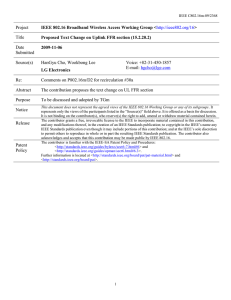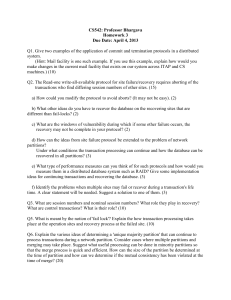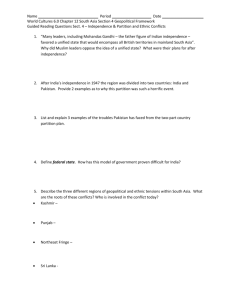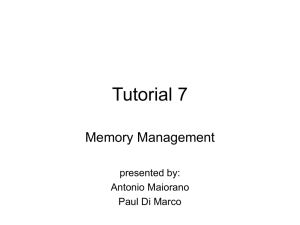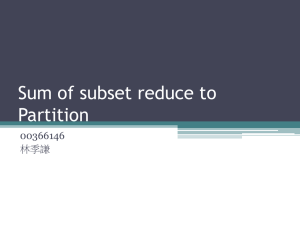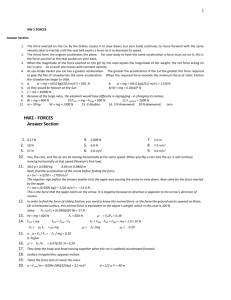Project
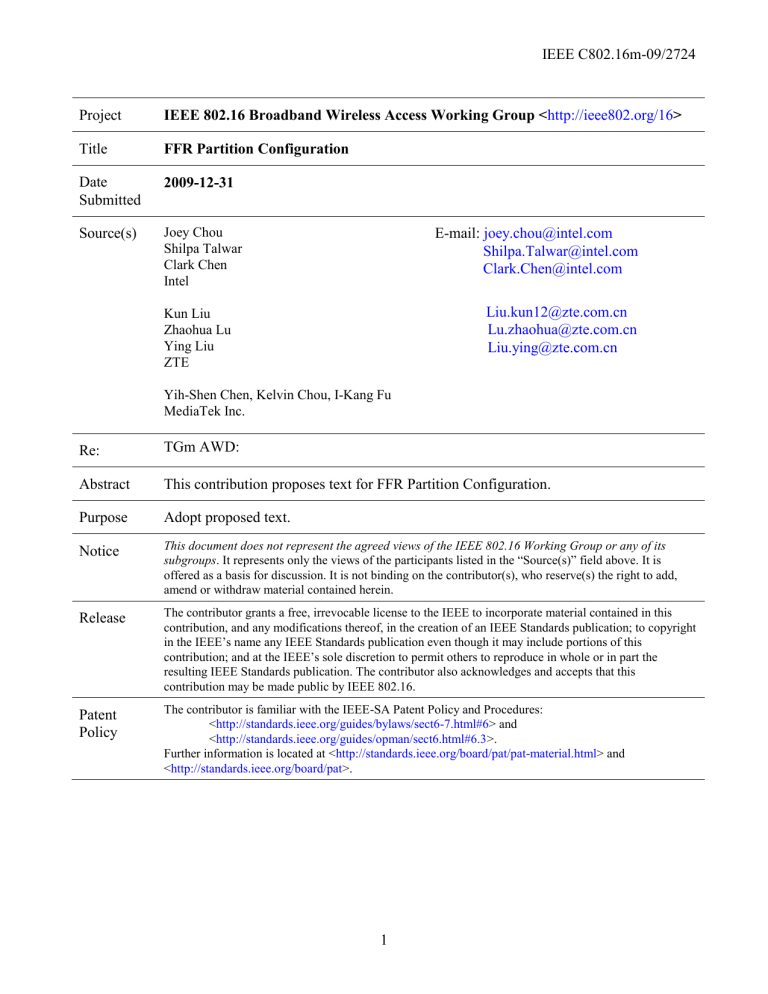
IEEE C802.16m-09/2724
Project
Title
Date
Submitted
IEEE 802.16 Broadband Wireless Access Working Group < http://ieee802.org/16 >
FFR Partition Configuration
2009-12-31
Source(s) Joey Chou
Shilpa Talwar
Clark Chen
Intel
Kun Liu
Zhaohua Lu
Ying Liu
ZTE
Yih-Shen Chen, Kelvin Chou, I-Kang Fu
MediaTek Inc.
Re:
TGm AWD:
Abstract
Purpose
E-mail: joey.chou@intel.com
This contribution proposes text for FFR Partition Configuration
.
Shilpa.Talwar@intel.com
Clark.Chen@intel.com
Liu.kun12@zte.com.cn
Lu.zhaohua@zte.com.cn
Liu.ying@zte.com.cn
Notice
Release
Patent
Policy
Adopt proposed text.
This document does not represent the agreed views of the IEEE 802.16 Working Group or any of its subgroups . It represents only the views of the participants listed in the “Source(s)” field above. It is offered as a basis for discussion. It is not binding on the contributor(s), who reserve(s) the right to add, amend or withdraw material contained herein.
The contributor grants a free, irrevocable license to the IEEE to incorporate material contained in this contribution, and any modifications thereof, in the creation of an IEEE Standards publication; to copyright in the IEEE’s name any IEEE Standards publication even though it may include portions of this contribution; and at the IEEE’s sole discretion to permit others to reproduce in whole or in part the resulting IEEE Standards publication. The contributor also acknowledges and accepts that this contribution may be made public by IEEE 802.16.
The contributor is familiar with the IEEE-SA Patent Policy and Procedures:
< http://standards.ieee.org/guides/bylaws/sect6-7.html#6 > and
< http://standards.ieee.org/guides/opman/sect6.html#6.3
>.
Further information is located at < http://standards.ieee.org/board/pat/pat-material.html
> and
< http://standards.ieee.org/board/pat >.
1
IEEE C802.16m-09/2724
FFR Partition Configuration
Joey Chou, Shilpa Talwar, Clark Chen
Intel
Kun Liu, Zhaohua Lu, Ying Liu
ZTE
Yih-Shen Chen, Kelvin Chou, I-Kang Fu
MediaTek Inc.
I.
Introduction
This contribution proposes text for FFR Partition Configuration.
II.
Proposed text
---------------------------------------- Start of proposed text ----------------------------------------------
10.1 Global values
Table 554—Parameters and constants
System Name Time Reference Minimum
Value
Default
Value
ABS FFR Partition Update
Interval
Time between FFR partition updates
1 minute 60 minutes
16.2.20.1 DL FFR
Maximum
Value
143200 minutes
Fractional Frequency Reuse (FFR) techniques allow different frequency reuse factors to be applied over different frequency partitions. The maximum number of frequency partition is four. Note that the frequency partition is defined in <<<Clause 15.3.5.2.3>>>.
The frequency partition boundary is aligned with PRU units. The frequency partitions are indexed from lower Logical Resource Unit (LRU) index to highest LRU index. It always starts from reuse-1 partition if exists and then followed by the three reuse-3 partitions. They are numbered as frequency partition 0 (FP0), frequency partition (FP1), frequency partition (FP2), and frequency partition (FP3) respectively. The frequency partition configuration should be semi-static and change with very long interim. The minimum interim is TBD.
16.2.20.3 FFR Partition Configuration
The FFR partition configuration should be semi-static and not be changed frequently. The interval between two FFR partition changes is determined by the FFR Partition Update Interval parameters, as defined in Table
2
IEEE C802.16m-09/2724
554. At each FFR Partition Update Interval, ABS should report to the upper entity the following information
– BSID, the number of MS in the BS, MS location distribution, and MS UL/DL SINR distributions, UL / DL traffic distribution, ABS’s transmission power of each frequency partition, UL IoT control parameter
IoT per
FFR partition (as defined in <<<16.2.20>>>) that are to be used to calculate the FFR partitions size, Power
Levels, Relative Load indicator –Reference resource metric, and Reference UL IoT control parameter
IoT for each partition that will be used for FFR partition configuration.
---------------------------------------- End of proposed text ----------------------------------------------
3
